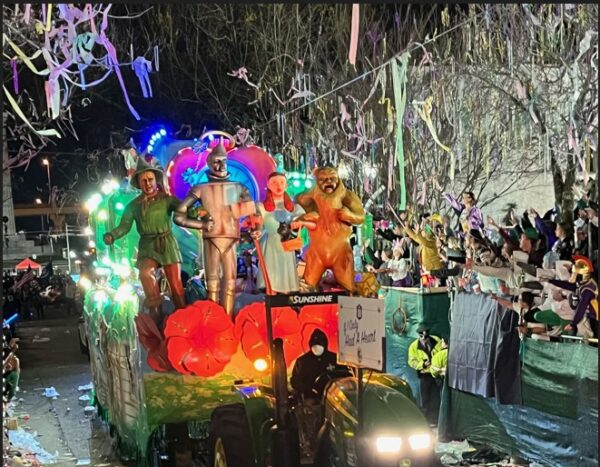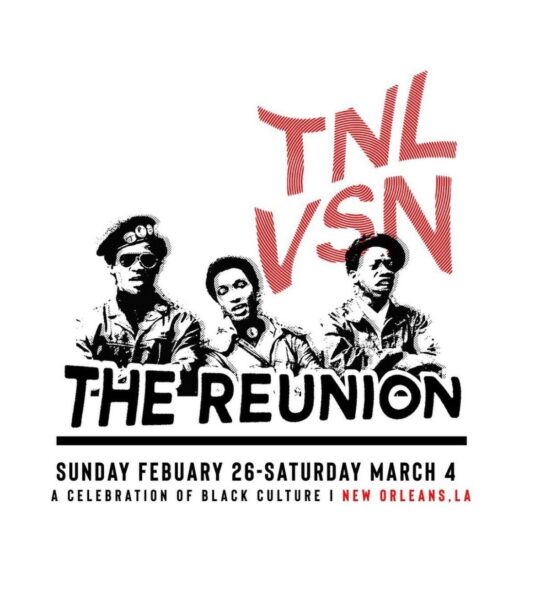
A Mardi Gras parade float moves through New Orleans – Nia Woodside
As part of our newsletter we like to highlight new narratives and voices from people working our space. This month we’re featuring Nia Woodside, a reporting fellow with our LPC partner Lede New Orleans. Lede equips creative professionals from underrepresented communities, age 18-25, with skills, tools and resources to transform local media.
Take it away, Nia!
As I drive around Uptown New Orleans to the University of Loyola, where I’m a junior, the remnants of Mardi Gras are everywhere. Some of it’s gorgeous, like the purple and silver bead necklaces dangling from cypress trees like gleaming Spanish moss, making the branches shine. A lot of other things I see aren’t so pretty. Heading up Broadway street I see mostly black workers cleaning up mountains of red drink cups, masks and other debris left behind by parade goers. While predominantly white tourists come to town for a good time at the parades, and leave behind their worries and trash, the reality of Mardi Gras for many Black residents is pretty mixed. Many of the jobs in the tourism industry, where Black residents are disproportionately represented, are low-wage and temporary, which can make it difficult for locals to make a living wage. Additionally, the influx of tourists during events like Mardi Gras can drive up prices for goods and services, making it more difficult for locals to afford basic necessities.
60 percent of New Orleans residents are, like me, Black, and yet the power structures that surround Black residents, from cultural events like Mardi Gras, to my university, to local industries like oil, where my parents work, are predominantly White institutions (PWI). Yes, PWIs have made some adjustments in recent years, but, as I move around my city I’m still constantly coming and going from spaces that I have to work to carve out an equitable space in and to explain why I belong. I’m tired of being in the majority in my city but treated as a minority when it comes to my future and ambitions. I’m trying to decide if I’ll stay in New Orleans when I graduate in a year, and whether or not this city can be a place that values my voice and lets me create my own narrative.
To give you an example of the dichotomy of being Black in New Orleans, my university recently created a multicultural center designed to support African American students. I can honestly say that I am there every day working with students of all types of backgrounds in learning and teaching. It can be exhausting having to create that space for ourselves. Yes, the physical space was given but oftentimes minorities have to explain why it’s valid. A prime example is my University’s week-long celebration called “The Reunion,” which happens the last week of February and is a way for Black students to celebrate the beauty of what it is to be Black and educate those that aren’t part of that experience. Yes, “The Reunion,” is amazing to put on and be a part of but oftentimes once again we have to do this for ourselves. This week-long event was one way to make sure that leaders of the university see how important it is to uplift and celebrate different cultures on campus. Although this was a week there are year long impacts and implications.
 The exhausting work that it takes to push for equity isn’t just required at my school. I can see it in our Mardi Gras celebrations, dominated by tourism, a PWI. Our local traditions and customs are appropriated for the benefit of tourists, and local artists and musicians are often exploited for commercial gain. African Americans are constantly trying to explain the history of second lines, the history of why Black parades like Zulu and NOMTOC are in existence. Zulu dates back to the early 1900s when African Americans were not included in Mardi Gras krewes, and NOMTOC first marched in the early 1970s to cater to Black Westbank residents who wanted to participate in Mardi Gras.
The exhausting work that it takes to push for equity isn’t just required at my school. I can see it in our Mardi Gras celebrations, dominated by tourism, a PWI. Our local traditions and customs are appropriated for the benefit of tourists, and local artists and musicians are often exploited for commercial gain. African Americans are constantly trying to explain the history of second lines, the history of why Black parades like Zulu and NOMTOC are in existence. Zulu dates back to the early 1900s when African Americans were not included in Mardi Gras krewes, and NOMTOC first marched in the early 1970s to cater to Black Westbank residents who wanted to participate in Mardi Gras.
We didn’t create our own parades because we wanted to be apart, we HAD TO BE. Black institutions like Zulu, called social aid and pleasure clubs, also arose during segregation when African Americans weren’t allowed to have insurance. They still raise money to help anyone in the community who is in need. This instilled a mentality in the community to rely on each other instead of PWIs.
Growing up both of my parents were employed in the petroleum industry, another predominantly white run industry. My dad once came home with a chemical burn from a work accident. He seemed unfazed by this as if it was normal. Other jobs can be dangerous, but this was different, he was working in a space where his health was on the line, while the larger profit went to a PWI.
As I became older and learned about the impacts of the oil industry on workers and local communities, things like Louisiana’s cancer alley, it brought up conflicting emotions because this dangerous job gave me and my siblings a comfortable life. My parents risked their lives and unfortunately put others’ health at risk. Some may say it’s a choice but we can look back just 20 years ago and see how few jobs were available for Black and Brown people to take care of their families.
Post college I’m thinking about leaving Louisiana. The thought of exiting my comfort zone is nerve-racking, which is crazy considering everything I’ve outlined here.There’s so much more for me to learn and experience, but I’m worried that it’s hard enough in this world without the support system I’ve always relied on. The only time I’ve left my comfort zone is when I was forced to, during Hurricane Katrina. Like a lot of Black families, mine was displaced, and I was bewildered and tried to acclimatize as a small child while also witnessing my family suffer. I think going through that makes the decision to leave my family and friends even harder.
When I think about graduating from college a year from now there’s a lot to consider. What space do I want to be in? How will I continue to advocate for myself and most importantly how will I impact the little girls around the world that are feeling exactly how I was? How can I make sure they are safe and feel heard? Is that something I can do in New Orleans? Can I do this from anywhere? I need to know how to navigate, allowing myself to flourish and still know that I am doing something for those around me.
